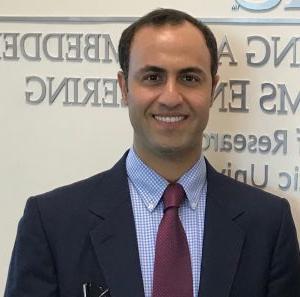
Cyberphysical Systems and Energy
Reza Azarderakhsh, Ph.D., an assistant professor in the College of Engineering and Computer Science and an I-SENSE fellow, collaborated with the National Institute of Standard and Technology (NIST) to minimize attacks on quantum computers. His work is a part of the competition for standardization of post-quantum cryptography and it has been moved to the second round of evaluations.

Mehrdad Nojoumian, Ph.D., plans to integrate his knowledge and experience gained through research to into novel curricula of cryptographic engineering courses and provide independent research opportunities to students. He will also focus on efficient hardware and software implementations as well as side-channel investigations of quantum-safe candidates. Nojoumian is an assistant professor in the Department of Computer and Electrical Engineering and Computer Science.
Nojoumian was awarded $300,135 from the Army for his work with the Incentivizing Blockchain Miners to Avoid Dishonest Mining Strategies by a Reputation-Based Paradigm.
Hanqi Zhuang, Ph.D., lead author published in the Journal of the Acoustical Society of America, observes the reproductive cycle of fishes, including groupers using deep neural networks – a set of algorithms modeled after the human brain to classify grouper species by their sounds. Zhuang is an Associate Chair and professor in the Department of Computer and Electrical Engineering and Computer Science and in the College of Engineering and Computer Science.
Nurgun Erdol, Ph.D., developed an automated classification algorithm – Fish Acoustic detection Algorithm Research (FADAR), capable of identifying species of groupers in their natural environment with a classification accuracy. Erdol is a professor and Department Chair in the Computer and Electrical Engineering and Computer Science.


